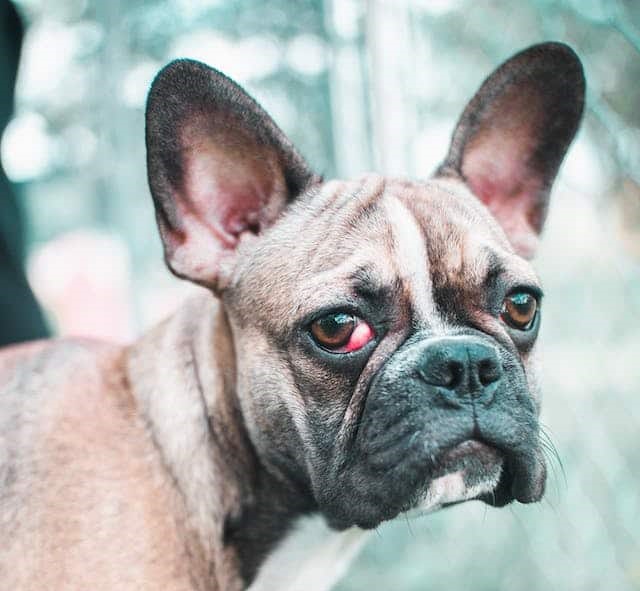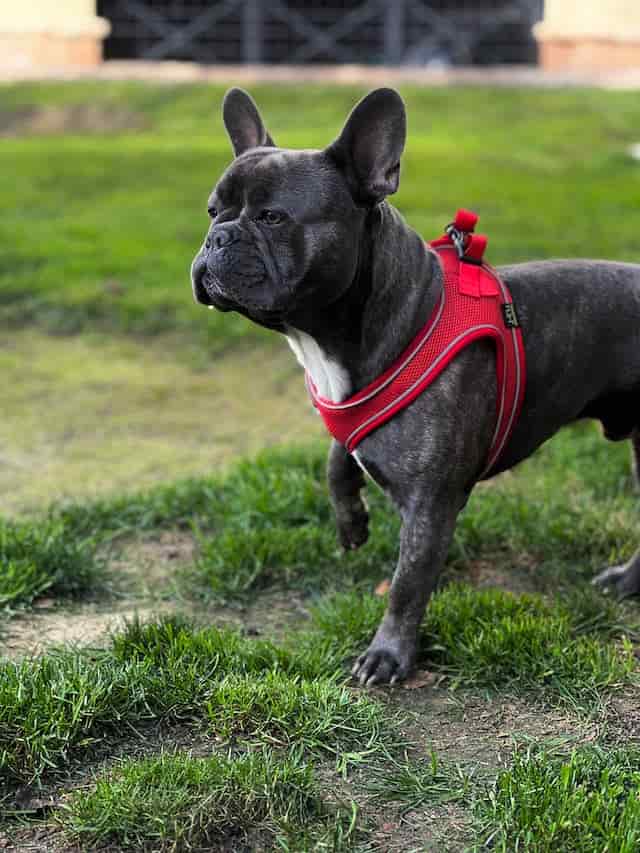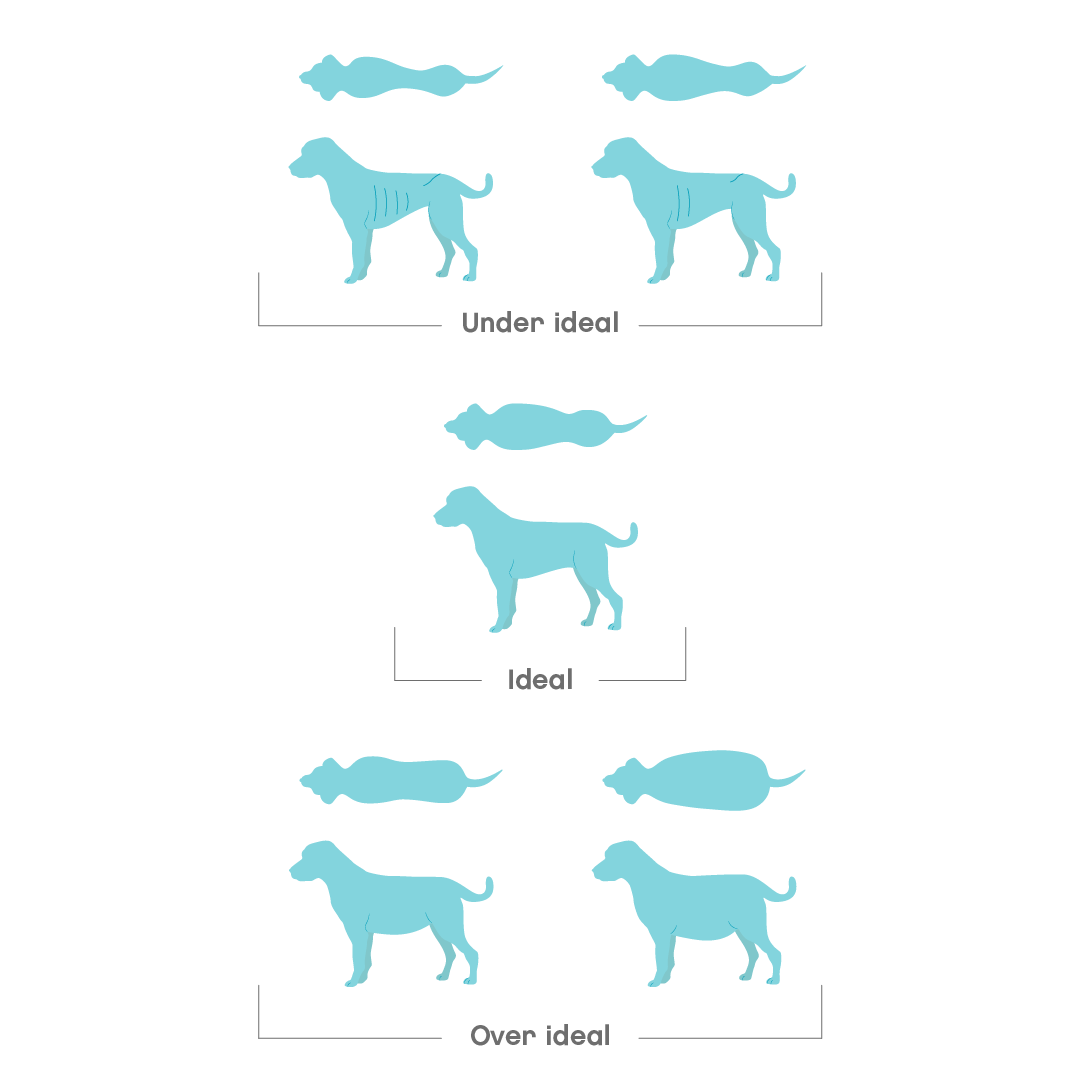French Bulldogs have quickly become one of the most popular breeds in the UK. It’s easy to see why, with their loveable nature and gorgeous, big bat-like ears.

French Bulldogs are playful, friendly and affectionate dogs who love being around their people. But it’s important to be aware that they come with extra responsibility due to the risk of health problems and the high costs associated with those health problems. Always remember to do your research into breed-specific health risks before getting a dog so that you know what to look out for.
Do you have a Frenchie, or are you thinking about getting one? Read our handy guide on what to expect, good and bad.
- Average weight 11–12.5 kg (small breed)
- Average life expectancy: 10 years
- Exercise requirements: minimum 1 hour per day
- Temperament: Quirky, social, and great with people of all ages
6 things to be aware of in French Bulldogs
There are several health problems that French Bulldogs are at high risk of. Not every Frenchie will develop these, but it’s important to be aware of what to look out for.
Breathing problems in French Bulldogs
Brachycephalic (flat-faced) breeds are prone to a problem called BOAS. This stands for brachycephalic obstructive airway syndrome. This is often the reason for those little snorting and grunting noises that Frenchies make. And often, they snore louder than a lot of humans!
- Having BOAS results in breathing difficulties and other problems, as the abnormalities mostly occur in the nose, windpipe, mouth, and throat.
- Symptoms of BOAS include snoring, regurgitation, and coughing. Some dogs are more severely affected than others. And there are both medical and surgical options for treatment. Find out more in our BOAS article.

Dental problems in French Bulldogs
There’s no doubt about it: Frenchies have cute and very squashable little faces. Unfortunately, this face shape has some negative impacts on oral health. Their shorter faces leave less room for the teeth, which are squeezed into a smaller area. Food becomes trapped, and bacteria, plaque, and tartar accumulate.
- Symptoms of dental disease include bad breath, drooling, red gums, and staining of the teeth.
- Treatment involves a thorough exam under anaesthesia. Severely affected teeth are extracted, and the others are scaled and polished.
- You can help reduce dental problems by brushing your dog’s teeth regularly and using a special dental food. Read more about dental problems in our article on periodontal disease and dental problems in dogs.

Skin and ear problems in French Bulldogs
French bulldogs have short, smooth and easy to maintain coats. This means they usually require minimal grooming. However, they are prone to ear infections, skin allergies, and fold dermatitis.
- Skin allergies can be due to fleas, food, or things in the environment such as pollen, dust mites, or grass. Allergies can lead to ear infections. Fold dermatitis is when their wrinkles become inflamed and sore. This is due to trapping of moisture and bacteria between the skin.
- Symptoms of these skin problems include itching, head shaking, red skin, hair loss, and pain.
- There are many options available (both over-the-counter and prescription only) for treatment of skin disease and allergies, depending on how severe the symptoms are. Find out more in our articles on skin allergies, food allergies, and ear problems.

Eye problems in French Bulldogs
French bulldogs have big personalities – almost as big as those expressive and prominent eyes of theirs. However, as their eyes are so exposed, they are prone to injuries and infections. French bulldogs have a higher risk of corneal ulcers, cherry eye, dry eye, and conjunctivitis.
- Symptoms of eye problems include rubbing at the eyes, red eyes, discharge (clear, yellow, or green), holding their eyes closed, and swelling in or around the eyes.
- Treatment of eye problems in Frenchies depends on the underlying condition. Cherry eyes (and sometimes ulcers) usually require surgery. Dry eye, conjunctivitis, and ulcers are usually treated with eye drops. Read more about ulcers, cherry eye, dry eye, and conjunctivitis in our articles.

Upset tummies in French Bulldogs
French Bulldogs are known for being enthusiastic eaters. And while having a dog that isn’t a fussy eater can be a good thing, it can also cause problems.
- In Frenchies, the most common causes of tummy upsets are food allergies, inflammatory bowel disease, and eating things they shouldn’t. BOAS can also lead to vomiting and regurgitation.
- Often, a special diet is all that is needed for treatment, but other diseases, such as parasites, will need to be ruled out too. Read our vomiting, diarrhoea, and food allergies articles to find out more.

Mobility problems of French Bulldogs
Frenchies are very adaptable; they don’t take up much space and have relatively minimal exercise requirements. However, they are prone to some mobility problems, such as disc disease, dislocating kneecaps, and spinal deformities.
- Symptoms include limping, skipping, swaying when walking, stiffness, and dragging their legs.
- French Bulldogs have a higher risk of being born with spinal deformities. This can lead to hind leg weakness and balance problems.
- Treatment of mobility problems in French bulldogs depends on the condition. There are usually medical and surgical options for most of the conditions. Surgery, if needed, for spinal disease is often major. Medical options involve strict rest and anti-inflammatory medications.
- Having any of these conditions can increase the risk of developing arthritis, often at a younger age. See our articles on patella luxation and limping for more information.

Tips on caring for your French Bulldog
Preventative healthcare
We recommend keeping your dog up-to-date with yearly vaccinations and regular parasite preventatives (especially fleas and worms). Regular check-ups (at least once a year) are important for a full vet assessment, including their teeth, weight, and heart.
Neutering is recommended, especially for female dogs, to reduce the risks of pyometra and mammary cancer. It’s recommended to neuter dogs when they reach musculoskeletal maturity. This is around 8-10 months old for French Bulldogs.
Be aware that French bulldogs rarely give birth naturally; they usually need a C-section. This comes with anaesthesia risks for both mum and pups, as well as considerable expense.
What to feed your French Bulldog
It is a controversial question, and there is an overwhelming amount of information out there.
There is not one “suits all” diet for French bulldogs. They are prone to food allergies, which are mostly due to the protein source in the food, i.e chicken or beef. Dogs’ nutritional needs change throughout their lives, from puppies to adults to seniors, depending on how active they are and if they are pregnant. Keep their food and routine consistent, and avoid feeding table scraps to reduce allergy flare-ups.
Hills Prescription Diet z/d is ideal for food trials, and Hills Prescription Diet Derm Complete is a great long-term choice for dogs with food and environmental sensitivities.
It’s important to keep your French Bulldog at a healthy body weight. Being obese can worsen breathing, mobility, and many other problems.
Body Condition Scoring (BCS) in dogs
Body Condition Score (BCS) is a scale that gives a practical evaluation of the fat coverage of your dogs body. By checking how easy or not it is to feel certain bony areas of the body, a score is then produced. There are several scales, from 1 to 5 or 1 to 9. The ideal body condition lies in the middle, so either 3/5 or 5/9.
The body areas normally checked for fat coverage are:
1. ribs and spine
2. hips and shoulders
3. waist

Here are a few tips on how to do it.
With your pet in a standing position:
- Place your hands on the rib cage and gently feel for each rib, without pressing too hard
- Feel the waist and look from the top and the side (if you have a very furry breed, it may be harder to assess)
- Feel the spine, which runs down the middle of the back
- Feel the top of the hips and shoulders
Home care for French Bulldogs
A plus side of owning a French Bulldog is that they are a small breed and don’t need much space, so they are suitable for people living in apartments. Although your Frenchie might be happy to snooze all day on the sofa, exercise and mental stimulation are important at all ages. French Bulldogs need at least 1 hour of exercise daily. Mental stimulation, such as using snuffle mats, slow feeders, and puzzle toys, helps prevent boredom and behavioural issues.
Grooming for French Bulldogs is fairly low maintenance; they don’t tend to shed much. Weekly brushing is often all that is needed, along with more frequent cleaning of the ears and skin folds. Some Frenchies need special shampoos if they have sensitive skin. Daily tooth brushing is highly recommended.
Particular care should be taken with exercise, especially in the hot months. French Bulldogs are at much higher risk of heat stress. Find out how to prevent this in our article on heat stroke.
Costs of owning a French Bulldog
The cost of looking after a French Bulldog is extremely variable but is often higher than that of other breeds.
Consider the following when looking into costs:
- Purchase costs (often £3000+) and insurance costs (average around £1000/year)
- Day-to-day costs: food, treats, bowls, poo-bags, lead, collar, bed, blankets, toys, oral hygiene products, etc. Dog walker, doggy day care, training costs.
- Medical costs are extremely hard to estimate and vary widely depending on what conditions your dog has, how severe the symptoms are, and if the condition is life-long. As a rough guide, treating a Frenchie with anti-allergy tablets (and nothing else) may cost around £60-100 per month.
Thinking of getting a dog? Remember to do your research when choosing a breeder. The Kennel Club has tips on what to look for and a list of assured breeders.

French Bulldogs are a loving and playful breed of dog to have as a pet. They’re funny little characters that provide endless entertainment.
Our Joii vet team is available 24 hours a day; call us now if you have any questions about your Frenchie.











